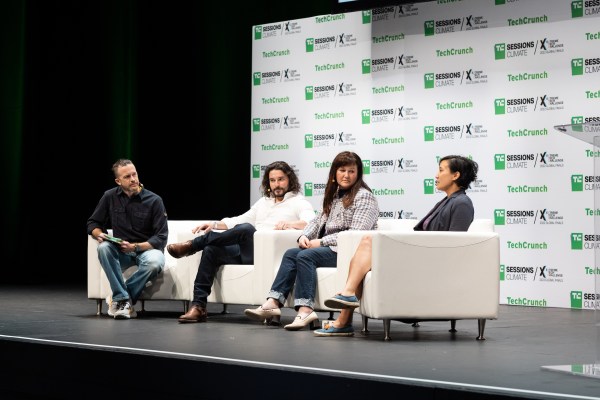Few sectors have boomed in the past few years like climate tech has. But despite the burgeoning urgency driving interest and investments, the ongoing market downturn is threatening to dim the prospects of many bright startups.
But are climate tech VCs as gloomy as the rest?
Three investors active in the space joined me on stage at TC Sessions: Climate 2022 this week in Berkeley to share why they’re in it for the long haul, the problems they’re looking to tackle and how they find the startups poised to make an impact.
After the clean tech bust a decade ago, and given the current downturn, there are concerns that climate tech may be doomed to repeat the mistakes of the past. Christian Garcia, a partner at Breakthrough Energy Ventures, said there might be some casualties, but overall, that won’t be the case. Climate tech, unlike clean tech, he feels, is here to stay.
“Everybody is walking into this with eyes wide open, that this is the change that has to happen in our economy, and therefore, our investments into this space have to exist in order to be a big part of that future economy.” Pae Wu, a general partner at SOSV and CTO of IndieBio
“There’s a little bit of a difference, which I agree with — the opportunity is bigger, right? We rebranded it because it’s decarbonizing everything. I think that exists and that opportunity exists regardless of what the Nasdaq is doing.” Garcia said.
Pae Wu, a general partner at SOSV and CTO of IndieBio, agreed: “This is probably one of the greatest opportunities that we have in front of us right now, and I think our LPs largely understand this, too.”
Garcia and Wu were joined by Kiersten Stead, managing partner at DCVC Bio. While all these firms have a broad portfolio of investments, they share a similar approach to the vetting process. That’s partly because many of their investments are focused on deep tech, the challenging and time-consuming technologies that have the potential to make the biggest impact on the climate.
“We’re surrounded by people who are scientists in various areas,” Stead said. “So we have people on the biology side, people who are fungal biologists. I’m a geneticist by training, and then at DCVC, we also have physicists; we have people who have worked in the nuclear energy business. So we generally pull on members of our team to diligence things and have built our team to be able to contribute to companies once we make investments. And of course, we have lots of friends, so if there’s a little piece that we need questions about, we can reach out to them.”
For Garcia, nuclear power is one deep tech area that spurred his firm to build a team versed in a range of approaches to the energy alternative, from small modular reactors to novel fusion reactors.
“We’ve been very, frankly, surprised. I think we made our first nuclear investment maybe four or five years ago, and it was a very cautious investment. We’ve been very surprised that now it’s even in the conversation. I think it just goes back to how much people are realizing that there’s urgency to this problem,” Garcia said.
“The largest impact you can possibly have in this space is nuclear energy,” Stead said of the energy sector. “So we’re big proponents of that. We invest in it where we can, where it’s viable, where we see big outcomes. The biggest contributor to greenhouse gasses today is still energy via petroleum. So that is the big elephant in the room.”
Given the difficulty of addressing climate change — and the risky, uncertain nature of many of the potential solutions — I asked the three VCs why they’re bullish on climate tech and how they balance its competing demands of profit and impact.
“Our job is to take risk, to a degree, and to risk it on teams that we think are truly talented,” Stead said. “So that’s one piece of the equation. But the other side of the equation is that the world doesn’t receive the benefit of anything unless it can scale, unless it’s fundable, unless there’s a great market with it and it’s profitable.”
Garcia agreed that scale and profitability are key parts of the equation, and that they can’t be separated from profit. “If you’ve kind of filtered for impact, there’s no world where you can actually have an impact unless you build a huge company that takes market share; that gets to cash flow,” he said. “I think once you’ve kind of set your aperture around carbon reduction or impact, you can only get there through a mega financial return.”
“Everybody is walking into this with eyes wide open,” Wu said, “that this is the change that has to happen in our economy, and therefore, our investments into this space have to exist in order to be a big part of that future economy.”
For more on this and other topics, including why Stead and DCVC won’t invest in companies that require “the stroke of a pen” to be viable, grab a virtual ticket to see the full 30 minutes of our conversation at TC Sessions: Climate 2022. You’ll get full, on-demand access to this session and all the rest from Tuesday’s event as well as programming and networking opportunities at our online event happening today.
